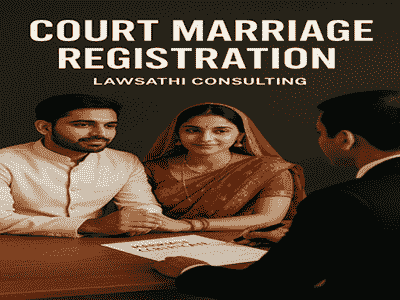
Court Marriage Procedure in India
Complete Procedure About Court Marriage in India (Same Day, Hindu Marriage Act, Special Marriage Act, NRI Court Marriage)
Court marriage in India provides a legal and transparent way for couples to marry, irrespective of religion, caste, or nationality. It ensures official recognition and protection under Indian marriage laws. Whether you are an Indian citizen or an NRI, understanding the procedure helps you avoid legal complications and delays.
About Court Marriage
Court marriage is a legal union between two consenting adults performed before a Marriage Officer under the Special Marriage Act, 1954, or the Hindu Marriage Act, 1955, depending on religion and circumstances.
Unlike traditional ceremonies, court marriage involves no rituals—only legal documentation and mutual consent.
Types of Court Marriage
Under the Hindu Marriage Act, 1955
This applies when both parties are Hindus, Buddhists, Jains, or Sikhs.
The marriage is solemnized in a temple or as per customary rites, followed by registration at the Registrar’s office.
Under the Special Marriage Act, 1954
This applies to inter-religious couples or when one or both partners do not belong to the same faith.
It is directly solemnized by the Marriage Officer after fulfilling all procedural requirements.
Eligibility Criteria for Court Marriage
To ensure legality, the following conditions must be met:
Age requirement: Groom – minimum 21 years; Bride – minimum 18 years.
Consent: Both must give free and voluntary consent.
Marital status: Neither should have a living spouse.
Mental condition: Both must be of sound mind.
Prohibited relationships: The couple must not be within prohibited degrees of relationship, unless permitted by custom.
Documents for Court Marriage
Before applying, prepare the following documents:
Passport-size photographs (4 to 6 each)
Aadhaar Card, Passport, or Voter ID (proof of identity)
Birth certificate, 10th-class certificate, or passport (proof of age)
Residential proof of both parties
Certificate of unmarried status or affidavit
Passport and visa copy (for NRIs or foreign nationals)
Two to three witnesses with valid ID and address proofs
All documents should be self-attested and verified before submission.
Procedure for Court Marriage
Let’s understand the complete process step by step:
- Notice of Intended Marriage
Under the Special Marriage Act, either party must give a written notice to the Marriage Officer of the district where at least one partner has resided for 30 days before submission.
- Publication of Notice
The Marriage Officer displays the notice for 30 days, allowing objections. If no objection arises, the marriage proceeds.
- Objection Handling (If Any)
If someone objects, the Marriage Officer examines it within 30 days. Whether the objection lacks merit, marriage moves forward.
- Declaration and Signature
After 30 days, both parties and three witnesses sign a declaration before the Marriage Officer, confirming consent.
- Solemnization and Certificate
The marriage is solemnized in the presence of witnesses, and the officer issues a Marriage Certificate, legally valid across India.
Same Day Court Marriage
Yes, same-day court marriage is possible under the Hindu Marriage Act, provided all necessary documents are ready, both partners are Hindus (or from a related faith), and the ceremony takes place according to Hindu customs.
After the ceremony, the couple can register the marriage on the same day through an advocate specializing in same-day marriage registration.
Under the Special Marriage Act, same-day marriage is not possible due to the mandatory 30-day notice period.
Court Marriage for NRIs in India
For NRIs or foreign nationals, the procedure remains the same but requires additional documents:
Passport and visa copies
Certificate of unmarried status from the home country’s embassy
Proof of stay in India for 30 days
Local ID proofs
If one partner is a foreign citizen, a “No Objection Certificate” may be required.
After marriage, the Marriage Certificate issued in India is valid globally and can be attested by the Ministry of External Affairs for international use.
Legal Benefits of Court Marriage
Provides legal protection and proof of marriage
Facilitates visa, passport, and immigration processes
Ensures property, inheritance, and maintenance rights
Helps in inter-religious and inter-caste unions without societal barriers
Important Legal Points
Hindu Marriage Act applies to Hindus, Buddhists, Jains, and Sikhs.
Special Marriage Act applies to all citizens regardless of religion.
Marriage without registration holds no legal validity for official or foreign documentation.
Always register marriage before the Marriage Officer, not through unauthorized agents.
Advocate for Court Marriage in Delhi
Choosing the right legal expert saves time and avoids mistakes.
An experienced court marriage advocate in Delhi ensures proper documentation, manages notices, and handles objections efficiently.
Frequently Asked Questions (FAQs)
Q1. Can I marry the same day in court?
Yes, if both are Hindus and all documents are ready, same-day marriage under the Hindu Marriage Act is possible.
Q2. Can NRIs marry in India under the Special Marriage Act?
Yes, they can, but one partner must have stayed in India for at least 30 days before giving notice.
Q3. Is a court marriage valid abroad?
Absolutely. It holds legal recognition internationally.
Q4. How much time does a court marriage take?
Under the Hindu Marriage Act, 1 day; under the Special Marriage Act, about 30–35 days. It depends on current circumstances as well.
Q5. Are witnesses mandatory for a court marriage?
Yes, at least three witnesses are required to complete the legal procedure.
Conclusion: Court marriage in India is a simple, lawful, and transparent process that empowers couples to marry by choice. Whether you seek a same-day marriage in Delhi or an NRI marriage registration, understanding the right act, documents, and process ensures smooth execution.
Always consult an experienced court marriage lawyer in Delhi to handle documentation, affidavits, and registration efficiently.
Keywords: Court marriage in India, same day marriage in Delhi, court marriage procedure, Hindu Marriage Act marriage, Special Marriage Act marriage, NRI court marriage in India, documents required for court marriage, advocate for court marriage in Delhi, same day court marriage registration, best lawyer for NRI marriage in Delhi.
Disclaimer: This article is for educational and informational purposes only. It provides a general understanding of legal remedies but does not constitute legal advice. For specific legal guidance, you can consult a legal expert.




